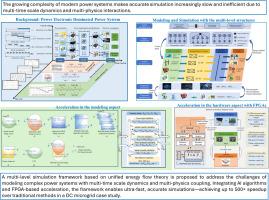基于fpga加速的高功率变换器多时域系统多级ai集成仿真框架
IF 9.6
Q1 COMPUTER SCIENCE, ARTIFICIAL INTELLIGENCE
引用次数: 0
摘要
随着可再生能源和电力电子设备的日益集成,现代电力系统的复杂性大大增加,由于多时间尺度动力学和多物理场耦合,使得建模和仿真具有挑战性。针对这些问题,本文提出了一种基于统一能量流理论的多级仿真框架。该框架使用能量传输函数和统一的基于能量信息流的代理模型分层构建系统,并定义端口,确保与人工智能算法的兼容性。通过整合人工智能技术,如反向传播神经网络,该框架预测具有高计算复杂度的变量,提高了准确性和仿真效率。利用现场可编程门阵列(fpga)的多级仿真架构可以实现比实时更快的系统级仿真和实时组件级建模,时间分辨率小至5纳秒。光伏发电、电池存储和电力电子转换器的直流微电网案例研究证明了所提出的方法,在保持高精度的同时,比传统的Simulink模型实现了高达500倍的加速。结果证实了该框架能够捕获多物理场相互作用,优化能量分配,并确保动态条件下的系统稳定性,为先进的直流微电网模拟提供了高效和可扩展的解决方案。本文章由计算机程序翻译,如有差异,请以英文原文为准。

An FPGA-accelerated multi-level AI-integrated simulation framework for multi-time domain power systems with high penetration of power converters
The increasing integration of renewable energy sources and power electronic devices has significantly increased the complexity of modern power systems, making modeling and simulation challenging due to multi-time scale dynamics and multi-physics coupling. To address these challenges, this paper proposes a multi-level simulation framework based on unified energy flow theory. The framework structures systems hierarchically using energy transmission functions and unified energy information flow-based surrogate models with defined ports, ensuring compatibility with artificial intelligence algorithms. By integrating AI techniques, such as back propagation neural networks, the framework predicts variables with high computational complexity, improving accuracy and simulation efficiency. A multi-level simulation architecture leveraging Field Programmable Gate Arrays (FPGAs) enables faster-than-real-time system-level simulation and real-time component-level modeling with time resolution as small as 5 nanoseconds. A DC microgrid case study with photovoltaic generation, battery storage, and power electronic converters demonstrates the proposed method, achieving up to a 500× speedup over traditional Simulink models while maintaining high accuracy. The results confirm the framework’s ability to capture multiphysics interactions, optimize energy distribution, and ensure system stability under dynamic conditions, providing an efficient and scalable solution for advanced DC microgrid simulations.
求助全文
通过发布文献求助,成功后即可免费获取论文全文。
去求助
来源期刊

Energy and AI
Engineering-Engineering (miscellaneous)
CiteScore
16.50
自引率
0.00%
发文量
64
审稿时长
56 days
 求助内容:
求助内容: 应助结果提醒方式:
应助结果提醒方式:


